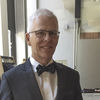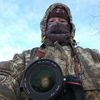Serge Ramelli
Mar 27, 2019 16:45:51 #
Mar 27, 2019 17:31:35 #
rcarol wrote:
Congratulations. That is clearly the longest rant that I've seen on this site.
Yeah. Whew! I have to take a nap to recover. The most prominent concept I come away with is the OP thinks of himself as the world's greatest expert on science in all its forms, and the rest of us are troglodytes and know-nothings. Obviously, neither is true, but even if they were he could benefit from a remedial course in concise writing and editing one's work. I'm in favor of a good rant, but his ideas could have been adequately expressed in half the length or less.
Mar 27, 2019 17:56:49 #
jdubu
Loc: San Jose, CA
aellman wrote:
Yeah. Whew! I have to take a nap to recover. The most prominent concept I come away with is the OP thinks of himself as the world's greatest expert on science in all its forms, and the rest of us are troglodytes and know-nothings. Obviously, neither is true, but even if they were he could benefit from a remedial course in concise writing and editing one's work. I'm in favor of a good rant, but his ideas could have been adequately expressed in half the length or less.
Absolutely... When I see that formatting and his name up, I just scroll down past.
Mar 27, 2019 20:16:55 #
Bipod wrote:
The old rule of programmers was "K.I.S.S" -- Keep It Simple, Stupid.
Seriously?? LOL!
Mar 27, 2019 20:45:27 #
Angel Star Photography
Loc: Tacoma, WA
streetglide12 wrote:
Good evening,
I have been doing manual photography for about a year. I have attended a few adult junior college classes on using manual. One of the adult students mentioned Serge Ramelli courses as a way to use my learning on a higher level. I researched the reviews about his system and they were 50/50 on using it. I trust the expertise here for solid advice. Thank you for your time.
I have been doing manual photography for about a year. I have attended a few adult junior college classes on using manual. One of the adult students mentioned Serge Ramelli courses as a way to use my learning on a higher level. I researched the reviews about his system and they were 50/50 on using it. I trust the expertise here for solid advice. Thank you for your time.
Well, after reading the responses and rants, I am curious as to whether we swayed the 50/50 split one direction or the other. LOL.
Adding my two-cents worth, I have found Serge Ramelli interesting and his methods and ideas intriguing as well as inspirational in terms using the many features of Lightroom and Photoshop. He is definitely heavy into post-processing and sometimes I feel that his work is over processed. However, he does bring forth information that often leads me to exploration into other possibilities in processing an image.
I have watched his videos, purchased some of his courses when they were on sale, and found them educational and helpful. I don't use his presets but I do selectively employ some of the techniques that he has wrapped into presets.
Overall, I like what I have gained from Serge. The following link is a bio which gives insight into why he is heavy into the post processing.
https://scottkelby.com/guest-blog-travel-photographer-and-filmmaker-serge-ramelli/
Additionally, you may find this information interesting:
https://www.imdb.com/name/nm2616280/?ref_=fn_al_nm_1
If you are curious or interested, I recommend that you give it a go but don't just view one or two videos. View a few, try out some of his ideas, and decide for yourself. I don't believe you will be disappointed.
Mar 27, 2019 21:11:19 #
rb61
Loc: Maple Grove, MN
jerryc41 wrote:
Lynda.com and CreativeLive are both very good. Ly... (show quote)
Lynda was free with my county library registration. I haven't checked lately.
Mar 27, 2019 22:47:15 #
Bipod wrote:
Hey now, I enjoy "Henri, le chat noir". I'd recommend the Great Courses videos with Joel Sartore. He's a for real National Geographic photographer with a nice manner about him and an interesting way of looking at the world. Some of his suggestions such as getting up high on a lift or putting your subjects flat on the floor while you stand on the kitchen counter are kind of weird he does get you to start thinking in different ways. Well worth the price for the videos.Check into his qualifications. For example, has ... (show quote)
Mar 27, 2019 23:25:04 #
Bipod wrote:
Check into his qualifications. For example, has ... (show quote)
It is easy to put someone down when he isn’t here to defend himself.
But one thing is for sure - his skills and photographs are superior to yours. That is a fact lady.
Mar 28, 2019 01:09:46 #
Bipod wrote:
Funny how everyone thinks he's smarter than Thomas Edison because her's screwed in an
LCD lightbulb. And of course, he's a way smarter than Ansel Adams because film is Old
Technology--and a better photographer.
If museums and collectors disagree, well, they're old technology too. The opinions that matter are on
Instagram and Twitter.
LCD lightbulb. And of course, he's a way smarter than Ansel Adams because film is Old
Technology--and a better photographer.
If museums and collectors disagree, well, they're old technology too. The opinions that matter are on
Instagram and Twitter.
Interesting post, full of sound and fury signifying nothing.
Mar 28, 2019 01:33:09 #
aellman wrote:
Yeah. Whew! I have to take a nap to recover. The most prominent concept I come away with is the OP thinks of himself as the world's greatest expert on science in all its forms, and the rest of us are troglodytes and know-nothings. Obviously, neither is true, but even if they were he could benefit from a remedial course in concise writing and editing one's work. I'm in favor of a good rant, but his ideas could have been adequately expressed in half the length or less.
Seems to have an issue with a bunch of photographers who enjoy another photographer who has a channel on YouTube.
I will not talk about his lack of comprehension.
Mar 28, 2019 01:37:31 #
Bipod wrote:
Check into his qualifications. For example, has ... (show quote)
You would be suspicious of anybody peddling a system? What about Ansel Adams and Fred Archer? They peddled the Zone System and if memory serves me right, it was very instrumental in producing a slew of followers that took beautiful images. But heh, who's counting?
Mar 28, 2019 01:44:46 #
Bipod wrote:
Funny how everyone thinks he's smarter than Thomas... (show quote)
You wrote,"Funny how everyone thinks he's smarter than Thomas Edison because her's screwed in an
LCD lightbulb."
I would like to see one of those LCD lightbulbs you reference in your rant. Pure fiction.
Mar 28, 2019 05:44:30 #
Lots of free tutorials on YouTube. Adam Gibbs channel can teach you a lot. Then again as others said it may just be time to put what you have already learned to practice.
Afraid after all that schooling you may be disappointed in your images. Practical experience and by experimenting your knowledge will grow in leaps and bounds.
Afraid after all that schooling you may be disappointed in your images. Practical experience and by experimenting your knowledge will grow in leaps and bounds.
Mar 29, 2019 01:03:19 #
I would say there are better coursed out there for field work. Already mentioned is Creative Live. I've bought courses by Art Wolfe, Franz Lanting, Chris Burkard. Ian Plant has his own site and some good courses too. But like Ramelli you will be inundated by persistent sales efforts. Not so bad with Creative. Creative often has sales, up to 50% off the courses on its platform, plus you can find discount coupons by searching on line.
But what I would really suggest is a live workshop with a local photographer. I my area you can find good courses in the $300-500 range for a full day or so of instruction, shooting and critique in a small group setting. Far more reasonable than what the nationally known names cost.
But what I would really suggest is a live workshop with a local photographer. I my area you can find good courses in the $300-500 range for a full day or so of instruction, shooting and critique in a small group setting. Far more reasonable than what the nationally known names cost.
Mar 29, 2019 01:39:56 #
streetglide12 wrote:
Good evening,
I have been doing manual photography for about a year. I have attended a few adult junior college classes on using manual. One of the adult students mentioned Serge Ramelli courses as a way to use my learning on a higher level. I researched the reviews about his system and they were 50/50 on using it. I trust the expertise here for solid advice. Thank you for your time.
I have been doing manual photography for about a year. I have attended a few adult junior college classes on using manual. One of the adult students mentioned Serge Ramelli courses as a way to use my learning on a higher level. I researched the reviews about his system and they were 50/50 on using it. I trust the expertise here for solid advice. Thank you for your time.
FWIW.... To everyone that said Ramelli talks to fast or his videos were to fast moving, you do know how to pause a video, or replay any part of it over again, don't you? Sure he has a French accent and at times is hard to understand, but he has almost 600 FREE videos on his YouTube channel covering a wide assortment of post processing topics using Lightroom, Photoshop, Luminar, and Aurora software, as well as how he composes images, shoots, and other topics.
When I first started using Lightroom, I Googled "Lightroom tutorials" and his tutorials were one of the first to show up in the Google search, so I watched one. I found it quite useful and informative, and I found many other videos covering different topics helpful as well. Other photographers that I often watched tutorials of were Anthony Morganti, Jim Nix, Julieanne Kost, and Aaron Nace. The same can be said here on UHH, there are many Hogs that have posted valuable info or links with helpful hints and information on how to do something.
Everyone has their own way of showing you their own style of post processing, as well as their own vision and style of photography, as we all do. But personally, I found Ramelli's tutorials to be very helpful when I first started out using Lightroom, and then Photoshop. I still watch his videos and the others when I need some help with a topic I am unsure about. The bottom line is, if you find someone that YOU feel is presenting tutorials that are useful to you and presenting information that is helping you to learn, then by all means watch their videos. After all, that is what it is all about... learning.
If you want to reply, then register here. Registration is free and your account is created instantly, so you can post right away.








